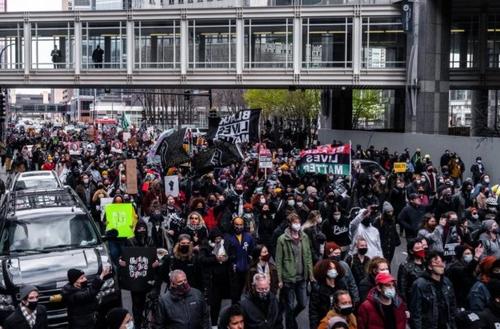DoJ Launches Probe Into Use Of “Excessive Force” By Minneapolis Police
As about half of America celebrates the guilty verdict handed down yesterday by a jury to former Minneapolis Police Officer Derek Chauvin, Democrats are moving to exploit the moment for maximum political impact. Even as the department struggles to recruit enough officers to fill the places left by a wave of quitters and retirees, AG Merrick Garland announced Wednesday that he is launching a federal investigation into the Minneapolis Police Department.
The investigation will focus on identifying whether the Minneapolis Police Department “engages in a pattern or practice of using excessive force including during protests,” Garland told a group of reporters on Wednesday during brief remarks at the DoJ.
As the NYT explains, so-called pattern-or-practice investigations are often the precursors to consent decrees, court-approved deals between the DoJ and local governments that create and enforce a road map for training and operational changes. The paper also noted that this new DoJ inquiry into the Minneapolis police department is different from the existing DoJ investigation into whether Officer Chauvin violated Floyd’s civil rights.
On Friday, Garland reversed a Trump era policy curbing the use of “consent decrees”, which the Obama administration had repeatedly used as a tool to address police misconduct.
Meanwhile, critics have already emerged to point out that Chauvin likely has a path to getting the convictions tossed out on appeal. Constitutional Lawyer Jonathan Turley published a column in the Hill explaining exactly how that might happen. Turley’s opinion largely focuses on remarks made by Congresswoman Maxine Waters, who traveled to Minneapolis to join the protesters ahead of the verdict.
Damage Below the Waters Line
Rep. Waters ignited a firestorm of controversy by flying to Minnesota to tell protesters to remain in the streets and fight for “justice,” to be “more confrontational,” despite days of rioting, looting and other violence. She said no verdict in the Chauvin trial would be accepted except a conviction for first-degree murder — a demand that might be a tad difficult to satisfy since Chauvin is not charged with first-degree murder. All of this as the jury literally headed off to deliberate.
Some of us immediately noted that Waters single-handedly succeeded in undermining not just the Chauvin case but her own case against former President Trump. Waters, one of several House members suing Trump for inciting violence on Jan. 6, is now his best witnesses against her lawsuit. Where she charged that Trump sought to incite violence and intimidate Congress, Waters is being denounced for inciting violence and intimidating the trial court.
One of those denouncing Waters was Judge Cahill, who declared in open court that “I wish elected officials would stop talking about this case, especially in a manner that is disrespectful to the rule of law and to the judicial branch and our function. If they want to give their opinions, they should do so … in a manner that is consistent with their oath to the Constitution.” Calling such comments “abhorrent,” Cahill added this haymaker: “I’ll give you that Congresswoman Waters may have given you something on appeal that may result in this whole trial being overturned.”
His statement was not just a criticism but a concession that Waters’ comments could not have come at a worse time or put the court in a worse position. Some of us have criticized Cahill — who has done an otherwise outstanding job — for not changing the trial’s venue or sequestering the jury. Those rulings came back to haunt him as protests grew before the trial and then exploded with the killing of Daunte Wright in nearby Brooklyn Center, Minn. One of the Chauvin jurors lives in Brooklyn Center, where rioting and looting occurred even before Waters flew in to throw gasoline on the fire.
Cahill denied a defense motion for a new trial but acknowledged that Waters’ comments magnified the appellate challenges in sustaining any conviction. Such statements alone are unlikely to overturn a conviction — indeed, such motions are notoriously hard to win — but Waters has made it far more difficult for prosecutors in the case. The tragic irony is that Waters could be used to overturn the very conviction she demanded. If that happens, it is unlikely that rioters will go to her home or burn businesses in her district. Those crimes will be focused in Minnesota but could spend across the country, too.
The danger for unrest may be greater due to the array of charges. It is not clear that a manslaughter conviction will satisfy protesters if it is accompanied by acquittals on murder. This was always a stronger manslaughter than a murder case. More importantly, adding the murder charges created a potential flashpoint for protests with any acquittal or later reversal on appeal. Moreover, while total acquittal seems unlikely, there is a possibility of a mix of acquittals and a hung jury that could ignite further rioting.
And with the trial of Chauvin’s fellow former Minneapolis officers now seemingly a forgone conclusion, we imagine there will be plenty more room for federal grandstanding by Democrats eager to burnish their ‘social justice’ credentials.
Tyler Durden
Wed, 04/21/2021 – 12:10
via ZeroHedge News https://ift.tt/3gz7WY9 Tyler Durden
